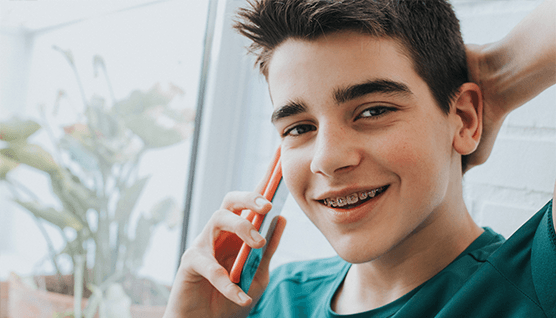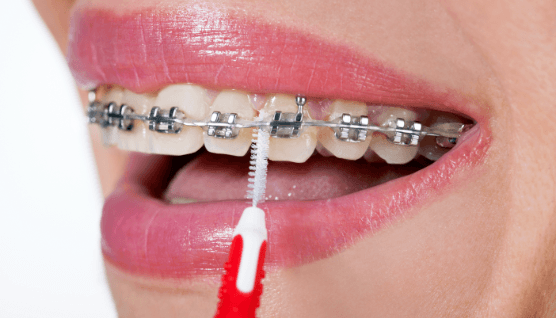What Do Braces
Feel Like?

Comfort
After a few days of adjustment, most patients barely notice their braces anymore. Some oral
tenderness and soreness are common right after they have been put on or adjusted, and a patient may
experience some “rough spots” where the brackets or wires rub up against the cheeks and
gums. Fortunately, the mouth adapts quickly, and these stop being a concern.

Speech
A person’s speech will not be greatly affected by braces initially. Certain syllables might
feel a little different, but once again, the mouth and tongue will adapt, allowing someone to speak
normally throughout treatment. Ultimately, braces will help someone speak more clearly in the end.
The “Do’s & Don’ts”
of Wearing Braces
To make sure a braces treatment goes as smoothly as possible, patients are asked to follow a few simple rules.
Thankfully, they aren’t complicated, and many of them are good for oral health whether or not someone has
braces!

Food & Drink
Particularly sticky, chewy, and hard foods should largely be avoided because they can easily become
stuck in the braces/wires or accidentally break a bracket. It is also wise for a patient to limit
their consumption of darkly colored drinks like coffee, wine, and soda. This is because they can
stain the teeth and cause the color to look uneven when the braces come off.

Music
For patients who play a wind instrument (brass or woodwind), they’ll find that their still
able to make beautiful music even with their braces. A little extra practice might be necessary at
first so a player can get used to the way their mouth feels.

Sports
For athletes, it’s extremely important that they always wear a mouthguard designed to fit over
orthodontics every time they play. This will protect their teeth and appliance should they
experience an accident.
The Braces
"No No List"
After getting braces, to ensure orthodontic treatment stays on track patients will need to make a few minor
adjustments to their day-to-day routines. The most important involves brushing and flossing and avoiding sticky,
chewy, or hard foods. These items can cause brackets failure and may lead to unnecessary irritation. Chewing gum
and eating potato chips are notorious for creating orthodontic emergencies.

Hard Foods
You don't want to damage your braces by chewing down too hard on tough foods! Patients should
avoid the following, or at least plan to eat them VERY carefully: pretzels, chips, beef jerky, nuts,
pizza crusts, and whole ice cubes.

Sticky Foods
Sticky foods may accidentally loosen the brackets and/or damage the wires, which can throw
orthodontic treatment off-course unexpectedly. Treats to avoid include caramels, toffee, gummy
bears, and definitely gum.

Non-Chewables
Patients who struggle with habits like nail-biting or chewing on pens/pencils should do their very
best to break the streak in order to minimze the chances of orthodontic damage. Your teeth and
braces will thank you!
Caring For
Your Braces
The day-to-day care for braces is essential for keeping the teeth healthy throughout the orthodontic process.
At-home hygiene will take a little more time with braces, but this is definitely worth it when it comes to
avoiding cavities and helping someone achieve their new smile as soon as possible.

Brushing
Ideally, a patient should brush their teeth after every meal and snack. This is because the
brackets can easily trap food against the teeth, increasing the risk of cavities. So, we recommend
always having a travel oral hygiene kit with you when leaving the house.

Flossing
Flossing is just as essential as brushing and should be done after every meal and snack. Regular
flossing can be tricky, but there are multiple interdental flossers designed to work around braces
that are available, and we can let you know which one would be best.




